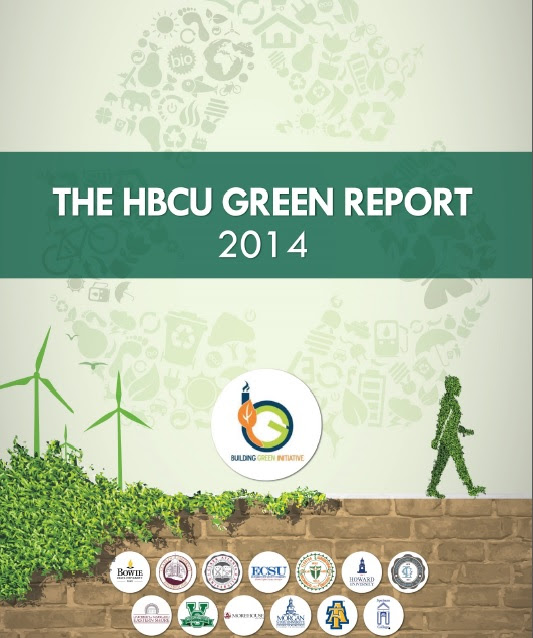
Administrators from the number one school on the Building Green Initiative’s list of top ten greenest HBCUs, UMES, stand in front of a picture of the school’s 17-acre solar farm. UMES administrators pictured (L-R): Dr. Ronnie Holden, vice president of administrative affairs; Dr. Maurice Ngwaba, assistant to the vice president of administrative affairs; Dr. Juliette Bell, president; Dr. G. Dale Wesson, vice president of research and economic development.
Atlanta, GA -A comprehensive survey released on Earth Day by The Building Green Initiative (BGI) at Clark Atlanta University says historically black colleges and universities (HBCUs) are driving energy efficiency on their campuses and promoting sustainability through their policies, practices and curriculums.
The survey ranked the nation’s most eco-friendly HBCUs and found the University of Maryland Eastern Shore (UMES) and Florida Agricultural and Mechanical University were the top green campuses among public institutions, while Spelman College and Howard University topped the list for private schools, BGI director, Felicia Davis announced today.
“Black colleges are going green,” said Davis. “This survey provides a clear picture of the wide-ranging activities underway at HBCUs to generate renewable energy, build to LEED Gold Certification standards and engage students in green initiatives, ecological curriculum and sustainable lifestyles.”
Rankings were determined by analyzing responses from 43 participating HBCUs in the areas of administration, energy efficiency, green building, recycling, renewable energy generation, food, transportation, purchasing, and student involvement.
“We determined that students are getting more involved in the environmental movement on HBCU campuses,” said Andrea Harris, president of North Carolina Institute for Minority Economic Development (NCIMED), the company commissioned to analyze the survey. “HBCUs are also using innovative, green technologies to address health, economic, and educational challenges in underserved communities.”

Mural lining the walls in the entrance of the newly renovated LEED Gold certified Laura Spelman Rockefeller Memorial Hall Building at Spelman College in Atlanta is a work of art that depicts change agents who have been part of the institution’s legacy of social activism since its founding in 1881.
According to the survey results, all of the top institutions have signed the American College and University Presidents Climate Commitment, created sustainability committees, and are taking steps to reduce campus emissions.
Innovative renewable energy solutions landed UMES as the top ranking school among all HBCUs. “The 17-acre solar farm we opened three years ago is now paying environmental and economic dividends. Our future plans will reduce our carbon foot print and also fully engage faculty and students in production-scale renewable energy generation research projects” said G. Dale Wesson, UMES vice president for research and economic development.
The participating schools were separated into two ranking categories: public and private institutions. Of the colleges surveyed, the top ten green HBCUs for 2014 are:
Public
1. University of Maryland Eastern Shore (Princess Anne, MD)
2. Florida Agricultural and Mechanical University (Tallahassee, FL)
3. Elizabeth City State University (Elizabeth City, NC)
4. North Carolina Agricultural & Technical University (Greensboro, NC)
5. (Three-Way Tie) Morgan State University (Baltimore, MD), Bowie State University (Bowie, MD) & Mississippi Valley State University (Itta Bena, MS)
Private
1. Spelman College (Atlanta, GA)
2. Howard University (Washington, DC)
3. Morehouse College (Atlanta, GA)
4. Livingstone College (Salisbury, NC)
5. (Tie) Claflin University (Orangeburg, SC) & Clark Atlanta University (Atlanta, GA)
Housed on the campus of Clark Atlanta University, the Building Green Initiative works to increase campus-wide sustainability at minority serving institutions with a strong focus on HBCUs. BGI is an advocate for innovative financing to support green building, energy efficiency retrofits, green revolving loan funds, interdisciplinary approaches to sustainability curriculum and student engagement. Formal partnerships with higher education environmental organizations, corporations committed to sustainability and an active BGI network expands HBCU access to a range of technical support.
NCIMED is an established nonprofit organization with 26 years of experience promoting and contributing data and information as key components of a knowledge-based economy.
For a full report on the findings go to http://buildinggreennetwork.org/?p=1346 or email iask@bellsouth.net.



